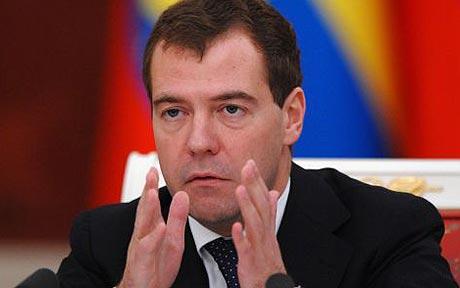
Iranian “Litmus Test” for Medvedev’s Problem Free Foreign Policy
Publication: Eurasia Daily Monitor Volume: 6 Issue: 201
By:

The style of Russia’s foreign policy has softened remarkably during the last year as President Dmitry Medvedev seeks to bring closure to the “episode” of the war with Georgia and wipe out all speculation on a hypothetical new Cold War. Gone are the “visionary” anti-American prophecies of a multi-polar world and bitter complaints of insufficient respect paid to a “rising” Russia by the declining West, that were trademarks of Vladimir Putin’s leadership. Russia’s new friendly face is perhaps an improvement, but with the change of style the substance of foreign policy has all but disappeared. When Medvedev presides over military exercises together with Alyaksandr Lukashenka or Nursultan Nazarbayev, it does not signify a surge in military cooperation with allies. Equally, his angry letter to Viktor Yushchenko, does not mean that a new Russian-Ukrainian “gas war” is in the making, while Prime Ministers Vladimir Putin and Yulia Timoshenko might indeed make it happen (Nezavisimoe voennoe obozrenie, October 16; Kommersant, October 31).
The current culmination of the long-running conflict over the Iranian nuclear program illustrates perfectly this lack of content in Medvedev’s policy. Moscow did play a useful role in hammering out –together with U.S. and the European troika– a joint proposal for sending the bulk of Iran’s low-enrichment uranium abroad and returning it as fuel for nuclear reactors. It does not, however, seem particularly disappointed with the predictable counter-proposal from Tehran that is aimed at buying more time for its uranium enrichment project (www.gazeta.ru, October 28; Vremya Novostei, October 26). During his meeting in September with U.S. President Barack Obama, Medvedev agreed that “in some cases, the use of sanctions is inevitable,” but the Iranian case apparently warrants only patient diplomatic maneuvers. Moscow appears eager to upgrade the “reset” of relations with the U.S. to a meaningful partnership, but it is perfectly happy with the strong support for Iranian defiance expressed recently by the Turkish Prime Minister Recep Tayyip Erdogan (www.newsru.com, October 27).
Voicing “principled” reservations against sanctions, Moscow equally finds every possible reason for delaying the launch of the Bushehr nuclear power plant –much to the frustration of its Iranian partners and no small damage to Russia’s reputation as a competitive nuclear contractor (RIA Novosti, October 26). Even more ambivalence exists around the $1 billion export contract on the surface-to-air missile system S-300PMU-2, which Moscow has never admitted signing and now characterizes as “frozen” (www.lenta.ru, October 23). This contract might have been the subject of the secret visit to Moscow of Israel’s Prime Minister Benjamin Netanyahu in September, and it resulted in considerable speculation around the still unexplained hijacking of the Arctic Sea freighter in the improbable location of the Baltic Sea (Rossiyskaya Gazeta, October 30). Medvedev, however, prefers to speak in general terms that “Iran needs a set of motives to behave appropriately.”
Medvedev’s only foreign policy success is not of his making as Washington sends its top negotiators to Moscow –National Security Advisor James Jones following U.S. Secretary of State Hillary Clinton– in order to maintain the dynamics of strategic rapprochement. Arms control is the main focus of these efforts and the new text that is to replace the expiring START I is taking shape, even if the Russian side is hugely reluctant to reciprocate with compromises. The key proposition in the agreement remains the same –strategic parity understood as numerical equality– and it is difficult to implement it as Russia’s aging nuclear arsenal is shrinking fast towards a level, which is uncomfortably low for the U.S. This desperate weakness in Russia’s position was aggravated by yet another unsuccessful test of the Bulava sea-based missile last week (this time it failed to clear the launch tube on the Dmitry Donskoy strategic nuclear-powered submarine), which the navy command has tried to deny (Nezavisimaya Gazeta, October 30). Medvedev uttered some unusually critical words about the outdated and over-priced products of the defense industry, but as far as negotiations are concerned, he cannot afford to be seen as giving too much ground to the pushy Americans (Ezhednevny Zhurnal, October 30).
There is certainly some value in more sober self-assessments than the recent delusions about “resurgent Russia,” but Medvedev’s increasingly obvious problem is his inability to initiate, not to mention enforce, any meaningful changes. He is a product of bureaucratic policies and court intrigues, trapped in the position of fake leadership, where a crowd of courtiers praises his every order without any intention of fulfilling it. He does not know how to connect with the real world and is afraid to expel Putin’s cronies from positions of power, because they know it too well. A few liberal advisors who recognize his predicament suggest leaving Putin’s “executive vertical” alone and building a parallel “vertical of modernization” that would take charge of Russia’s advancement in key strategic directions (Nezavisimaya Gazeta, October 30). This plan for circumventing the ruling bureaucracy has slim chances for implementation, but it reflects the maturing feeling of fin de siècle in the political elite as Putin’s reassurances that “business as usual” would return are disproved by the deepening recession (www.grani.ru, October 26).
October 30 in Russia is Remembrance Day for the victims of political repression, and Medvedev posted an entry in his video-blog condemning the “revisionist falsification of our history” aimed at justifying Stalin’s crimes; he asserted that “there is no excuse for repression.” This departure from Putin’s line of glorifying Russia’s past and erasing its dark pages may be just an attempt to re-establish his liberal credentials, which were compromised by sanctioning the results of the recent shamelessly falsified regional elections, particularly in Moscow (Novaya Gazeta, October 23). Nevertheless, it is a bold statement that goes against not only Stalin’s rising approval ratings, but also the widely-held conviction that Russia can only be governed by a “strong hand” (Ekho Moskvy, October 30). Medvedev’s “modernization project” –which still exists only as discourse– seeks to introduce a different model of creating room for “bottom-up” innovations, but as such it is incompatible with the system of power over which he is presiding so ambivalently.




